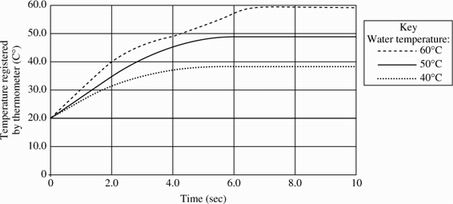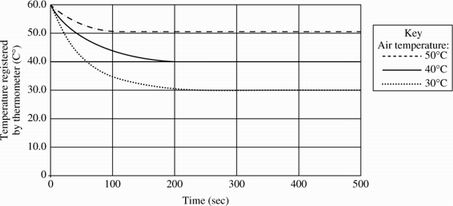
ACT Science Practice Test 55
Đề thi nằm trong bộ sưu tập: Tuyển Tập Bộ Đề Thi Đại Học Hoa Kỳ (ACT) - Có Đáp Án Chi Tiết
Số câu hỏi: 12 câuSố mã đề: 1 đềThời gian: 1 giờ
218,895 lượt xem 16,833 lượt làm bài
Xem trước nội dung:
PASSAGE III
A mercury thermometer, at an initial temperature of 20°C, was placed in 40°C water, and the temperature registered by the thermometer was recorded over time. This procedure was repeated using water samples at 50°C and 60°C (see Figure 1). Next, the same thermometer, at an initial temperature of 60°C, was placed in an air sample at 50°C, and the temperature registered by the thermometer was recorded over time. This procedure was repeated using air samples at 30°C and 40°C (see Figure 2).

Figure 1

Figure 2
(Note: Assume that the temperatures of the water and air samples did not change during the measurements.)
Based on Figure 1, at 3.0 sec, the thermometer reading in the 40°C water most likely was closest to which of the following?
47°C
42°C
36°C
29°C
According to Figure 2, for an air temperature of 30°C, over which of the following time intervals was the thermometer reading changing most rapidly?
0-100 sec.
100-200 sec.
200-300 sec.
300-400 sec.
When the thermometer was in the 40°C water, in the time interval between 0 sec and 2 sec, approximately how rapidly, in °C/sec, was the temperature registered by the thermometer changing?
1°C/sec.
5°C/sec.
10°C/sec.
40°C/sec.
Based on Figure 2, if the thermometer, at an initial temperature of 60°C, had been placed in an air sample at 20°C, how long would it most likely have taken the thermometer reading to reach 20°C?
Less than 10 sec.
Between 10 and 50 sec.
Between 50 and 100 sec.
Greater than 100 sec.
According to the passage, at which of the following did the thermometer register the highest reading?
Water temperature 60°C, 4.0 sec.
Water temperature 60°C, 2.0 sec.
Water temperature 50°C, 4.0 sec.
Water temperature 50°C, 2.0 sec.
PASSAGE IV
Clinical research has become an important element in the development of modern medicine. Perhaps one of the most widely-debated issues in today's clinical research is the use of placebos, treatments believed to be biologically ineffective but used anyway for psychological or experimental purposes; an example of a placebo is a sugar pill, which contains no medication. In the realm of clinical research, placebos are used to establish a control group within the pool of research participants. A certain percentage of research patients are administered the test treatment, and another percentage is administered a placebo treatment. Patients are not informed of which percentage they are a part.
For various reasons, the use of placebos in clinical research is a controversial issue. Two scientists debate whether the use of placebos is a good or bad practice in research.
Scientist 1
Placebos are an important aspect of clinical research for many reasons. Not only do they establish a control group for the test treatment in question, but they also help address the issue of mind over matter, which is an important issue when working towards treatment for a particular illness. The body is a powerful life force, with natural recuperative abilities. A placebo encourages such recuperation.
Placebos also address the psychological aspect of illness. Because patients are unaware of whether they are receiving treatment or a placebo, the possibility of receiving treatment often provides patients with a psychological boost. The use of placebos addresses the question of whether a person's positive attitude may be important in recovery from illness. As a result, the placebo effect-a change in the patient's condition due to the idea of treatment, rather than its biological effectiveness-may be a measurable change in behavior as a result of the belief in treatment.
For both their physical and psychological benefits, placebos should be used in clinical research.
Scientist 2
There are many reasons why placebos shouldn't be used in clinical research. For example, placebos encourage deception in the doctor-patient relationship. Because this relationship is crucial to the confidence of both the doctor and the patient, and therefore the overall success of the patient's involvement in a study, placebos not only deceive patients, but can also have an adverse affect on research results. Placebos also violate patients' autonomy, or their right to choose treatment. While they can choose to be involved in a study, patients are unable to select their own course of treatment because it chosen for them.
Some argue that the placebo is worth its implementation in order to evaluate for the occurrence of the placebo effect. However, such action may skew the results of the study. For example, placebo-related changes could be over-estimated. Different illnesses, by definition, will react differently to the placebo. For example, in the instance of chronic pain or mood disorders, it's possible for patients to show spontaneous improvement. The placebo effect can also result from contact with doctors or a respected professional. Patients are vulnerable to their environment, which significantly affects the psychological results of the placebo.
Due to its capability to skew research results, the placebo shouldn't be used in clinical research.
Which of the following is most consistent with the reasons supporting the use of placebos in clinical research? Many patients administered a placebo during a study:
found it very difficult to trust their various medical professionals.
found it much easier to deal with their illness due to the support of their doctors and medical team.
experienced a heightening in their overall confidence and willingness to beat their illnesses.
enjoyed no physical improvements while participating in the study.
According to Scientist 1's viewpoint, the placebo effect often reveals in the patient:
a negative change in behavior leading to a worsening of the patient's condition.
a positive change in behavior leading to recovery from the illness.
a negative change in behavior leading to a loss of faith in doctors.
no discernable change in behavior.
According to the passage, both Scientists agree that:
the implementation of the placebo is worthwhile for the evaluation of the placebo effect.
the use of placebos can cause the placebo effect in patients.
few patients experience any sort of a response to placebos.
placebos are valuable for both their physical and psychological effects on the body.
According to Scientist 2's viewpoint, which of the following observations provides the strongest argument against using placebos in clinical research?
The fact that patients sometimes deceive researchers
The danger of adverse reactions to sugar pills
The potential to skew the results of the research
The possibility that patients might choose ineffective treatments
An evaluation of several placebo-using studies found that those patients who were involved were not only very trusting of their doctors and medical teams, but they were also more willing to communicate the various effects the treatment was having on them. This finding contradicts evidence stated in which viewpoint?
Scientist 1's viewpoint, because the patients had a positive relationship with their doctors.
Scientist 1's viewpoint, because use of the placebos discouraged the medical team from obtaining accurate results.
Scientist 2's viewpoint, because placebos are a critical component in any clinical study.
Scientist 2's viewpoint, because the placebo studies encouraged rather than discouraged communication between doctors and patients.
Scientist 1's viewpoint implies that Scientist 2's viewpoint would be weakened by which of the following observations?
All patients in a control group recover less quickly than the patients receiving medical treatment.
Some patients seem to benefit from choosing their own treatments.
A patient who learns that she has been given a placebo becomes ill.
A patient who is given a sugar pill develops new symptoms due to an allergic reaction to the pill.
Which of the following assumptions about the use of placebos is implicit in Scientist 1's viewpoint?
Placebos are more cost-effective than other research tools.
Placebos are significantly more difficult to administer than real medications.
Real experimental medications are often dangerous to patients.
The use of placebos is safe for most patients.
